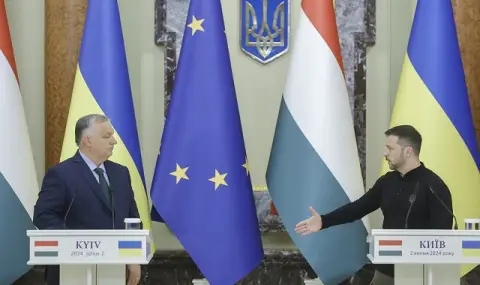Putin's friend and the head of state he presides over EU: Hungarian Prime Minister Viktor Orbán is trying to please “both ours and yours”, writes Ivan Preobrazhensky in his commentary.
Hungarian Prime Minister Viktor Orbán, for the first time since the start of Russia's war against Ukraine, arrived on July 2 in Kyiv and immediately offered the Ukrainians a unilateral ceasefire – so that they can start peace negotiations with the aggressor country Russia. Of course he got rejected. Moreover, Moscow does not hide that it monitors his activity carefully. What does she explain – is it only because the day before Orbán's visit, Hungary took over the presidency of the EU?
Not for the first time in Kiev
The Hungarian head of government last visited Ukraine in 2015, when he met with Petro Poroshenko, and before that – in 2012 for a meeting with Viktor Yanukovych. This Ukrainian president, judging by the policy of Orban himself, was much closer and understandable to him than Volodymyr Zelensky, with whom he had to negotiate this time. Like Orbán, Yanukovych was also oriented towards cooperation with Russia. And he, as well as the Hungarian prime minister, was accused of trying to turn his country into a mafia state. Yanukovych failed and now lives in his villa in Russia, guarded by Putin's special services.
In contrast, Orbán is still in power in Hungary. Now his country has also taken over the presidency of the EU, and the prime minister himself seems to want to sit in two chairs at the same time: to remain a friend of Vladimir Putin and to be an alternative leader of the EU. Despite all the alternativeness of Hungarian foreign and domestic policy to the common values and course of the EU, however, these two roles differ too much. And Orbán's attempt to reconcile them is reminiscent of the psychiatric diagnosis called split personality.
Kremlin dividends for Hungary
Viktor Orban's proposal to first cease fire and then start negotiations is clearly unacceptable to Ukraine. Volodymyr Zelensky did not even say anything personally about this matter, although his subordinates clearly stated that in Kiev they reject this idea. And it is clear why: Putin is not trusted at all, and even if there is a truce (something Orbán cannot guarantee, and has not tried to make such promises), it would still mean success for Russia, and not for Ukraine, as it would give the Kremlin the opportunity to keep the occupied territories and prepare for new pressure. In the current situation for Kiev, the ceasefire could rather be compared simply to capitulation.
However, Orbán was not upset by the refusal. While in Ukraine, his foreign minister, Peter Szijjártó, was in regular contact with his Russian counterpart, Lavrov – so the Hungarians have informed the Kremlin in real time about how Orban in Kiev is actually protecting Moscow's interests. The main – the demonstration of good intentions towards Russia took place, and Hungary can count on dividends from the Kremlin.
The agenda of the Hungarian EU Presidency
To the chronology of Hungary's foreign policy in recent years, the intention expressed on the eve of the visit to create a new right-wing populist faction "Patriots for Europe" should be added. together with the Czech ex-prime minister and populist Andrej Babis and the Austrian Freedom Party. It cannot be created immediately – it needs MPs from at least four more EU countries. But the request is clear: Hungary presides over the EU for six months, and its prime minister claims the role of leader of an “alternative” or – as he would prefer to call it - “patriotic“ Europe. At the same time, a Europe that (in the context of the war in Ukraine) wants to settle its relations with the Kremlin.
There is another important item on the agenda of the Hungarian EU presidency – migration policy. In this regard, even France and Germany are revising their policies in the direction of tightening – i.e. Orban is generally in rhythm. But unlike the leaders of democratic countries, the Hungarian authoritarian ruler can afford to say the most intolerant things about migrants, which he does.
Orbán: Europe's bad boy
In fact, Orban's attempt to sit on two chairs – as Putin's friend and as a European alternative “patriot” - it can also be seen as a response to a silent request of part of the European countries. They find it difficult to deal with intolerant migration measures popular with voters but unacceptable to the elite. In addition, some European politicians would like Ukraine to start negotiations with Russia, but they did not offer it, understanding in advance the reasons for the refusal.
And at that moment Orbán suddenly pops up, ready to personally tackle these complex topics. He probably assumes that this is how he strengthens his reputation, and the other European leaders are just waiting: if he succeeds, they will not object – neither in the field of migration policy nor in terms of Ukraine's negotiations with Russia, they will simply join. And even if Orbán fails, it is not fatal. It is likely that this failure will be so great that the power in Hungary itself will change and the autocrats in the EU will become one less.
